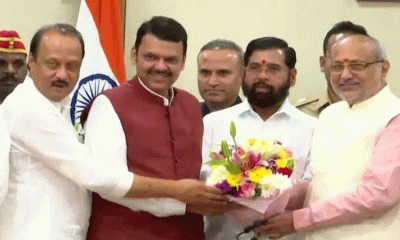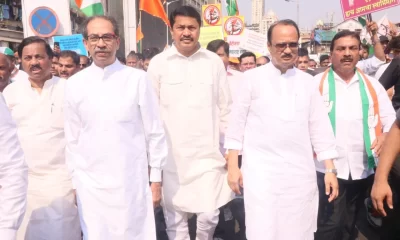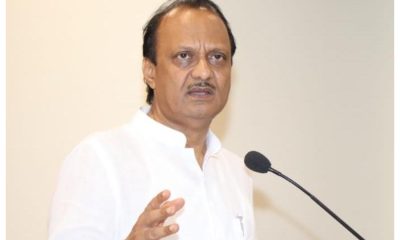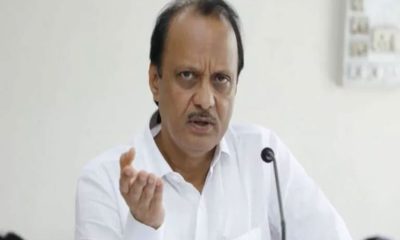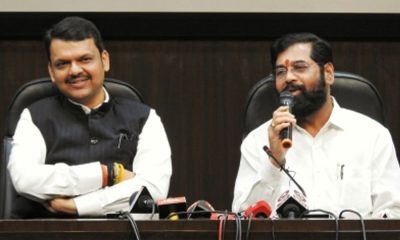Maharashtra
80-hour regime: Ajit Pawar, Fadnavis ‘ko gussa kyun aata hai’
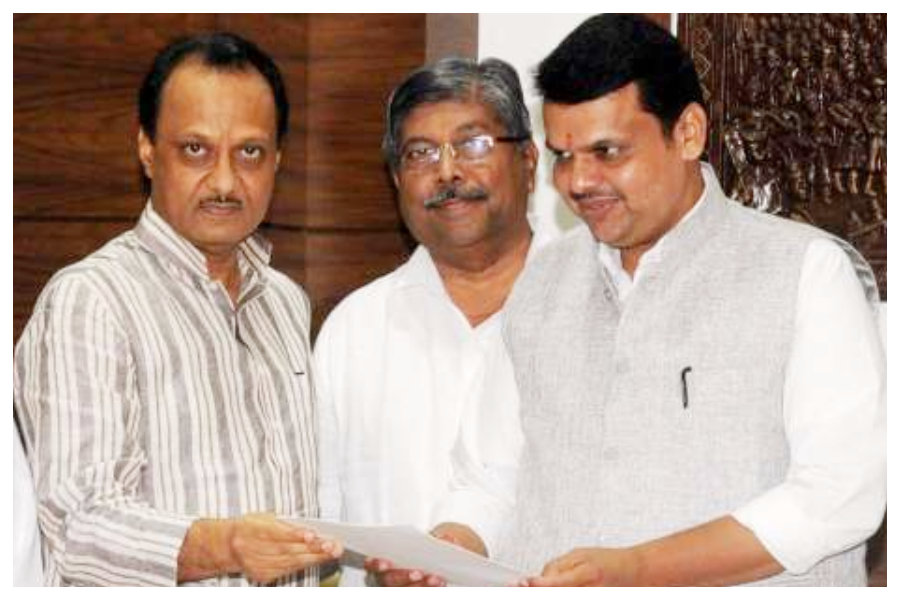
Thirty months after BJP’s Devendra Fadnavis and Ajit Pawar suddenly took oath as Chief Minister and Deputy Chief Minister respectively, in the morning of November 23, 2019, that incident continues to haunt and embarrass them.
Despite their best efforts to chase away the ghost of that clandestine swearing-in ceremony at Raj Bhavan that morning, it keeps popping up frequently in the most unexpected ways — this time raked up by none other than Chief Minister Uddhav Thackeray himself at his huge rally on May 14.
Replying to the Bharatiya Janata Party’s criticism, Thackeray declared that he allied with the Congress (and NCP) openly, not in an ‘early morning’ oath-taking ceremony of the 80-hour-long two-man regime — and his words pierced the target.
Willy-nilly, the CM also hinted at the ‘real secret’ behind why the Central probe agencies like the CBI, ED, NCB, I-T and the NIA keep hounding only the Shiv Sena and Nationalist Congress Party leaders for over two years.
The Shiv Sena President thundered saying if the BJP and MNS do not stop their vicious politics, hounding by the Central agencies, lodging false cases against the Maha Vikas Aghadi (MVA) government leaders or their families, then “we won’t forgive or spare you”.
“Tomorrow, they will go after Dawood (Ibrahim Kaskar) but if he joins them, he will be made a cabinet minister… If that (2-man govt) ‘experiment’ had succeeded, then people like Anil Dashmukh or Nawab Malik would have been in your good books,” said Thackeray amid applause.
As the MVA government trudges to the mid-way mark in its five year term, BJP’s Leader of Opposition Devendra Fadnavis continues to cry over the spilt milk, his ‘birth-right’ to power that he was unceremoniously deprived of after the 2019 Assembly elections.
The Ajit Pawar-Fadnavis duo has been lampooned and ridiculed since that indiscretion in Raj Bhavan, sans any trappings, but with the drapes drawn tightly to keep off peeping-toms prying at the political hustle enacted that dawn when the groggy state was engaged in its morning ablutions.
Once, displaying rare courage, Fadnavis confessed that “it should not have happened”, and again hammered Thackeray for ‘backstabbing BJP’ to grab power with the help of the Congress-NCP.
Even the much-pilloried Ajit Pawar, painted as a ‘black sheep’, feebly tried to justify the swearing-in event, saying it was not in the early morning as speculated, but “at 8 a.m.”, though later the NCP hugged him and rewarded him with the same post as Fadnavis did for 80 hours!
Wily Uncle and NCP President Sharad Pawar also never missed an opportunity to take a swipe at the dawn ceremony in his characteristic style.
In late-2020, when Governor Bhagat Singh Koshyari published a coffee table book, Pawar wrote to him how everything was there in his coffee table book “except a particular swearing-in ceremony”.
Congress state President Nana Patole also took a potshot saying Ajit Pawar was to “explain” it at an appropriate time, but has nothing till date.
“So much water has flowed under the bridge… We 3 parties are now working together, the government is running well… Why do you keep raising it repeatedly,” an irked Ajit Pawar said of that 80-hour fling, Monday.
There have been heated exchanges inside the Maharashtra legislature and outside with the MVA leaders laughing and leering at that morning venture while livid unrepentant BJP leaders shielding it.
Maharashtra
SP MLA Abu Azmi Moves Bombay High Court to Quash FIRs Over Controversial Remarks Labeling India as ‘A Golden Sparrow’ Due to Aurangzeb

Mumbai, June 30, 2025 — The controversy surrounding remarks made by Samajwadi Party (SP) MLA Abu Azmi continues to unfold as he has approached the Bombay High Court seeking to quash multiple FIRs registered against him. The filings stem from comments in which Azmi referred to India as ‘a golden sparrow’—a phrase he linked to the Mughal emperor Aurangzeb—drawing widespread attention and sparking debates over the nature of these remarks.
Azmi’s petition argues that his statements have been misinterpreted and taken out of context, claiming they are part of a historical narrative rather than a political statement. He contends that criminal proceedings against him are unjustified and that his freedom of speech should be protected under constitutional rights.
The FIRs, registered across various districts, allege that Azmi’s comments could incite communal tensions and offend sentiments linked to national identity. Critics have accused Azmi of making divisive remarks, while supporters argue that his statements are historical references meant to shed light on past rulers and avoid misrepresentations.
Legal experts suggest that the case revolves around balancing free speech against the potential to incite discord. The court’s decision on whether to dismiss the FIRs could have broader implications for political discourse and expression of historical perspectives in India.
As the matter remains under judicial review, it continues to fuel discussions across political circles and social media, highlighting the sensitive nature of historical narratives and freedom of expression in contemporary India.
Maharashtra
Thane–Dombivli Train Accidents: Injuries Surge Despite Decline In Deaths On Central Railway’s Busiest Stretch
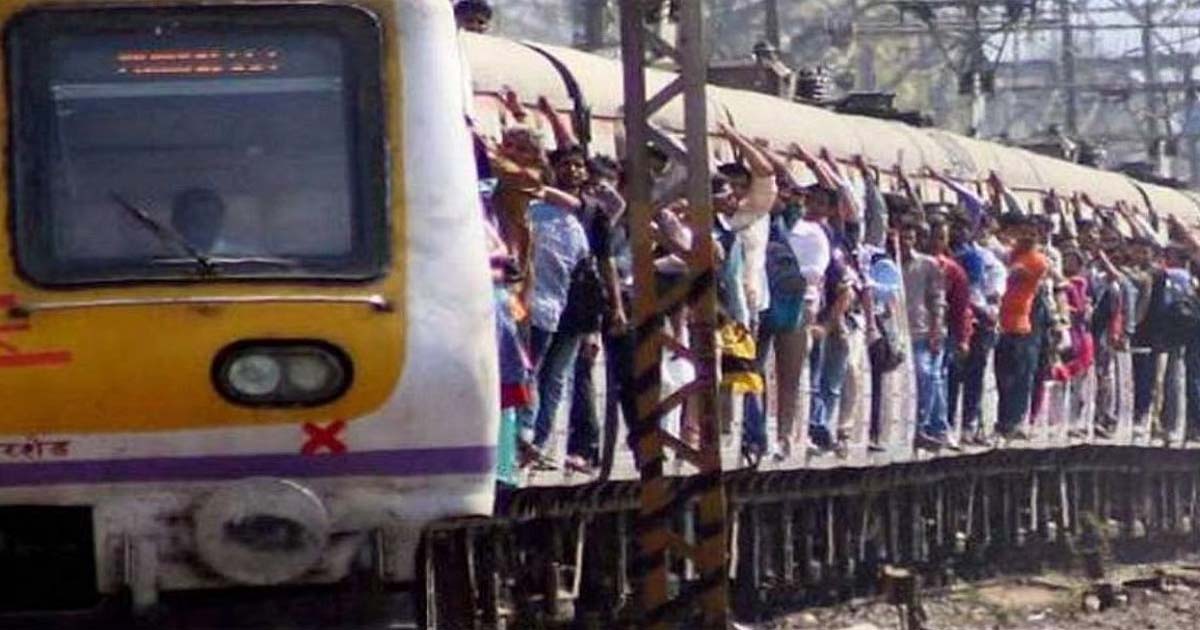
Mumbai: Even as fatalities due to passengers falling from overcrowded suburban trains on the Thane–Dombivli stretch have declined in recent years, injuries have spiked dramatically, triggering fresh alarm over commuter safety on one of Central Railway’s busiest and most dangerous corridors. Between January 2014 and December 2024, a staggering 1,025 passengers lost their lives and 1,829 were injured after falling from moving trains on this stretch.
The latest incident occurred on June 27, when a 21-year-old man died after falling from a moving train, nearly a kilometre away from the site of the Mumbra train tragedy reported on June 9th.
Decline in Fatalities, But Injuries on the Rise
The number of fatalities has shown a slight but consistent decline—from 152 in 2014 to 145 in 2022, then down to 112 in 2023 and 107 in 2024. While this suggests some improvements—possibly due to infrastructure upgrades and greater public awareness—the injury data paints a more concerning picture.
Injuries had decreased steadily from 259 in 2014 to 106 in 2022. However, 2023 saw an alarming reversal, with 144 injuries reported. This trend worsened in 2024, with 203 passengers injured—marking the highest number in nearly a decade.
Officials have pointed to overcrowding and changing commuter habits as the primary reasons behind the rising injury count. “If we compare the Thane–Dombivli stretch with the situation in 2014, there has been an increase of more than 25% in carrying capacity,” said one senior railway official. “But overcrowding during peak hours remains a critical challenge.”
A major shift in how passengers carry their belongings is also under scrutiny. “Earlier, passengers used to carry bags in hand or on one shoulder, which took up less space. Now, the use of backpacks—which take up nearly double the space—has become widespread, further reducing available space and leading to dangerous crowding at train doors,” the official added.
Debate Over Track Design
Around 15-kilometre Thane-Dombivli strech is considered one of the most accident-prone stretches in Mumbai’s suburban rail network. Several passenger rights activists blame poor track design and sharp curves—especially between Diva- Mumbra- Kalwa—for contributing to accidents.
Advocate Deepak Dubey, who lost his brother in April 2024 between Diva and Mumbra , said, “The railway must conduct safety audits and consider modern design solutions such as tunnels or flyovers to replace these outdated curves.”
Activist Siddhesh Desai argued that traditional track design no longer aligns with the realities of Mumbai’s overcrowded trains. “Curves are calculated based on ideal speed and load conditions. These assumptions break down under the pressure of extreme crowding, making doorways perilous zones,” he said.
Railway veterans, however, dispute the notion that poor track design is responsible. Former Central Railway General Manager Subodh Jain said, “It’s incorrect to claim that jerks on curves are the cause of falls. Modern railway curves are designed with transitions and compensations for centrifugal force.”
Jain emphasized that the core issue is passengers standing precariously at the edges of overfilled compartments. “The real danger comes from passengers being forced to hang out of doors due to lack of space, not from any flaw in track geometry,” he said.
Maharashtra
Muslims have not benefited from the ownership of waqf, try to inform Muslims about the Shariah status of waqf property: Mufti Manzoor Ziai
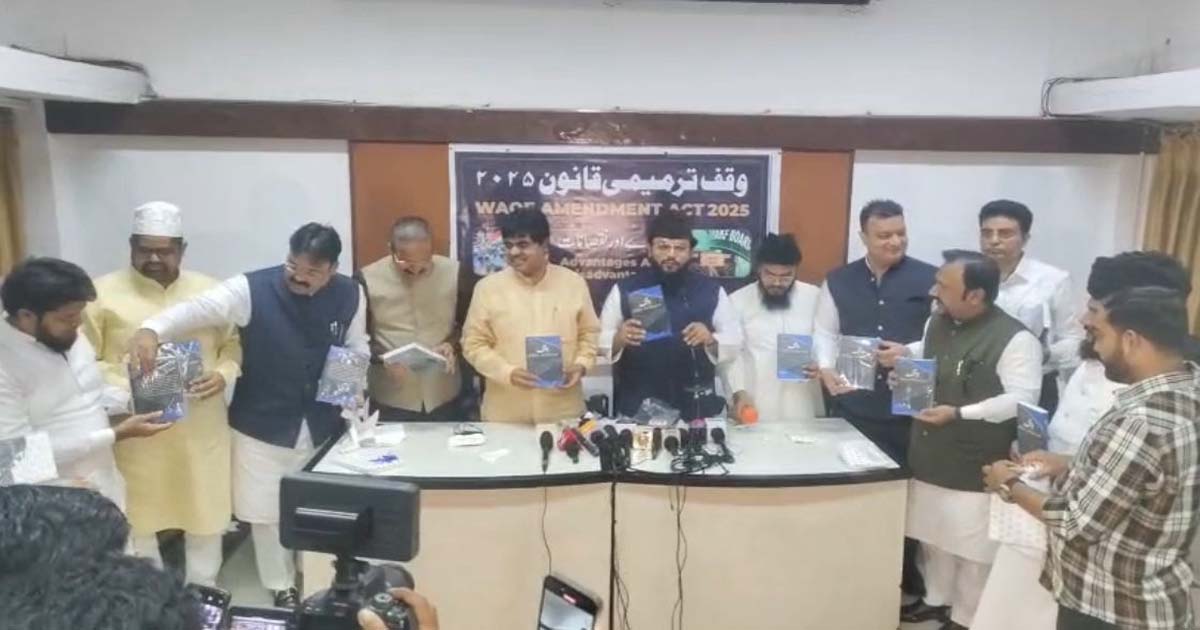
Mumbai: After the implementation of the Waqf law, Mufti Manzoor Zia’s book Waqf Sharia, Politics and Reforms in the Indian Context was launched at the Mumbai Press Club, in which Mufti Manzoor Zia openly admitted about the book and said that this book focuses on the Sharia status of Waqf and other issues in the context of Waqf law. This book has a very detailed discussion about Waqf in the context of Islamic teachings. Mufti Manzoor said that there has been a long series of protests against the Waqf law, but till now there has been large-scale division and misuse of Waqf properties.
Protesting against this act is a democratic right, but it cannot be done regardless of what has happened to the ownership of Waqf so far and who is occupying its property. Eliminating encroachment from the ownership of Waqf is also the need of the hour. This Waqf is done in the way of God, but the common Muslims have not benefited from the ownership of this Waqf. Big protests and processions are being held, but why no hospitals, educational institutions and medical institutions have been built on the endowment property? He said that even the talented people of the nation are not able to get educational scholarships. The condition of the Imams is pathetic.
The 12-year-old child of an Imam is struggling between life and death in a government hospital. That Imam cannot provide him medical aid because he has no resources. He said that the works that have been brought to light in the context of the Endowment Act are an attempt to highlight the status of the endowment as much as possible. When Mufti Manzoor Zia was asked what was the purpose of bringing this work to light only after the implementation of the Endowment Act, he said that the process of preparing the work related to the ownership of the endowment and its Sharia requirements was already underway.
It is a coincidence that it was released after the Endowment Act. He said that the Waqf property is reserved for Muslims but it is useless because petty thefts to corruption are common in it. He was asked whether the implementation of the Waqf Act will benefit Muslims now. He said that the matter related to the Waqf Act is under hearing in the Supreme Court, so it is too early to say anything on this right now. Congress leader Nizamuddin Rain, Anjuman Bashingan Bihar Mahmoodul Hasan Hakimi, scholars, elders of the city and dignitaries attended the function.
-

 Crime3 years ago
Crime3 years agoClass 10 student jumps to death in Jaipur
-

 Maharashtra9 months ago
Maharashtra9 months agoMumbai Local Train Update: Central Railway’s New Timetable Comes Into Effect; Check Full List Of Revised Timings & Stations
-

 Maharashtra9 months ago
Maharashtra9 months agoMumbai To Go Toll-Free Tonight! Maharashtra Govt Announces Complete Toll Waiver For Light Motor Vehicles At All 5 Entry Points Of City
-

 Maharashtra9 months ago
Maharashtra9 months agoFalse photo of Imtiaz Jaleel’s rally, exposing the fooling conspiracy
-

 Crime9 months ago
Crime9 months agoBaba Siddique Murder: Mumbai Police Unable To Get Lawrence Bishnoi Custody Due To Home Ministry Order, Says Report
-

 National News9 months ago
National News9 months agoMinistry of Railways rolls out Special Drive 4.0 with focus on digitisation, cleanliness, inclusiveness and grievance redressal
-

 Maharashtra8 months ago
Maharashtra8 months agoMaharashtra Elections 2024: Mumbai Metro & BEST Services Extended Till Midnight On Voting Day
-

 National News9 months ago
National News9 months agoJ&K: 4 Jawans Killed, 28 Injured After Bus Carrying BSF Personnel For Poll Duty Falls Into Gorge In Budgam; Terrifying Visuals Surface



